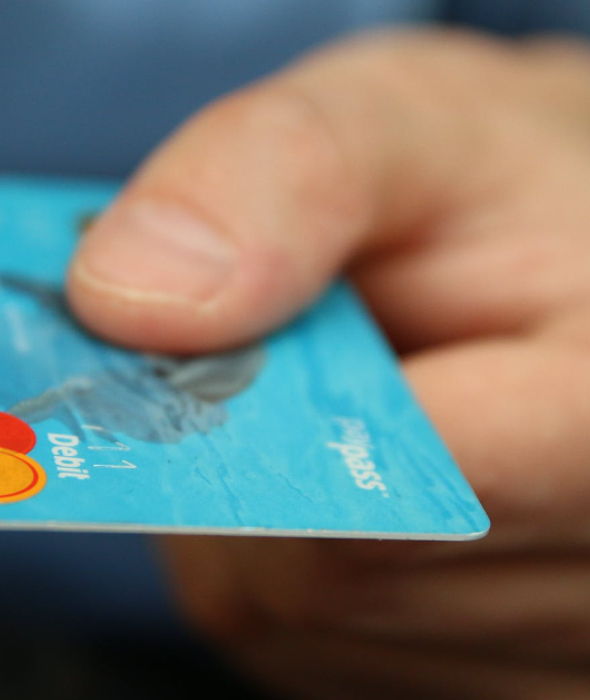
Share this Post
Subscribe

Need help with your money or investments? Book a consultation to learn more about working together.
Six Things That Happen When You Switch to Debit Cards
[Prefer to listen? You can find a podcast version of this article here: E177: Six Things That Happen When You Switch to Debit Cards]
As many of you know, I don’t use credit cards.
Cue everyone’s head exploding.
I’ve been using a debit card for years (over a decade now) for everything, including everyday purchases and bigger expenses.
I realize that most people use credit cards for pretty much everything. The allure of points and rewards is usually the rationale. And as a result, many people end up deep in credit card debt.
As I serve clients all over the U.S. and help them with cash flow planning and budgeting, I have noticed that credit card debt is a chronic and widespread problem. There are many reasons that credit card debt can get out of control, and one reason is the detachment that is created between purchasing something and actually paying for it, as I explain in this CBS News article on credit card debt.
When I find that someone is struggling with credit card debt and managing cash flow, I often recommend that they stop using credit cards (at least temporarily) to help reset their connection to spending money.
Switching to using only debit cards can be a great way to “detox” from the destructive spending habits that are sometimes created by credit cards.
Here are six things that happen when you switch to debit cards.
Life is Simpler
The first thing we notice when switching to debit cards is that life is simpler, mainly because you reduce the number of accounts to worry about.
When you only use a debit card, it’s very clear and direct. When you spend money, it comes out of your account. Plain and simple. There is no extra work to monitor both your credit card balance and your bank account or worse, monitor multiple credit cards.
Using a debit card simplifies your life.
You Spend Less Time on Your Finances
Along with a simplified life, you spend less time on your finances. When you use credit cards, you spend time chasing points, managing rewards, and (see above) monitoring balances across cards and accounts.
It may not feel like a lot of time, but all that task-switching adds up. Unless of course you just don’t worry about it, which often leads to getting into credit card debt.
You Spend Less Money
Here’s the big one. When you switch to a debit card, you likely end up spending less money.
There is plenty of research that suggests that using a credit card desensitizes you to the feeling of spending money and causes you to be willing to pay more for things as opposed to using cash or debit cards.
Credit cards “decouple” the act of buying from the act of paying for it which is one reason so many people get into unmanageable credit card debt. They buy things they wouldn’t otherwise buy and spend more than they otherwise would spend.
By the way, credit card companies know this, which is why they can afford to offer points and rewards. They would not offer these perks if it didn’t help them make money. They more than make up for it by charging interest on balances they’ve helped people rack up.
When you use a debit card, you “feel” the purchase more because you are aware that the money is coming out of your account immediately. This helps you spend less money.
Budgeting is Easier
If you maintain a budget based on income and spending from your checking account and you only spend "real" money (i.e. cash from your account - not credit) then you have a very clean and easy way to budget. You don't have to worry about how to categorize your credit card payments vs. things you buy on your credit card.
You might be thinking “but my budgeting app handles credit cards just fine!”
Yes, that may be true. However, you've added additional layers of complexity to your cash flow system, especially when you have multiple credit cards.
You Are More in Tune With Your Cash Flow
The most valuable thing that happens when you switch to debit cards is that you get clear visibility in your cash flow. You can plainly see what is coming in and what is going out in real time.
When this happens, you are able to unlock so much potential in your personal finances. You make better decisions about your money. You are more in tune with your spending habits. You start to see patterns more clearly that can help you build wealth.
Using “real money” in “real time” has a tremendously positive impact on your ability to manage your money.
You Stop Participating in an Exploitative System
Credit card rewards and points are the number one reason that people tell me they can’t give up credit cards. And while these points incentivize many to overspend, there are plenty of people who truly benefit from it and don’t get into debt.
However, it’s likely that those points and rewards are being subsidized by those who are less financially savvy, lower income, or are struggling financially.
Using real money and opting out of the credit card system is casting a vote against the exploitation that keeps credit card companies in business.
Is the Debit Card Life Right for You?
Like everything in personal finance, a debit-card-only life may not be for everyone. There are plenty of folks who use credit cards for everything, pay them off every month, and have very healthy money habits.
However, there are others who struggle with credit card debt and would see significant benefits from switching exclusively to debit cards.
My experience in the real world supports this premise. Every single person who has tried the switch reports positive results in almost all of the areas discussed previously. Some have even called it life-changing.
Only you can decide what’s right for you, but having an open mind to trying the debit card life can lead to some surprising revelations and advantages.
